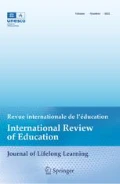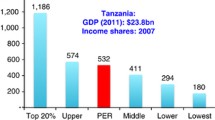Abstract
The present study analyzes educational targeting in Argentina, Brazil and Chile from a sociological point of view. It shows that a ‘logic of induction’ has become the vehicle for anti-poverty education strategies meant to help targeted groups improve on their own. The analysis explores the influence of the global educational agenda, the empirical connection between the logic of induction and the mechanism of emulation, and the territorial aspects of educational inequalities. Emulation plays a main role inasmuch as the logic of induction leads targeted groups to compare their adverse situation with more privileged groups, which actually legitimizes inequalities. A brief statistical summary completes the study, showing that educational inequality has remained unchanged as far as urban–rural ratios (in Brazil and Chile) and regional disparities (in all three countries) are concerned.
Zusammenfassung
GLOBALISIERUNG, BILDUNGSZIELE UND STABILE UNGLEICHHEITEN: EINE VERGLEICHENDE ANALYSE VON ARGENTINIEN, BRASILIEN UND CHILE – Die vorliegende Untersuchung analysiert Bildungsziele in Argentinien, Brasilien und Chile aus einem soziologischen Blickwinkel. Sie zeigt, dass eine ,Logik der Induktion‘ zum Mittel für Strategien zur Bildung gegen Armut geworden ist, die den Zielgruppen helfen sollen, sich aus eigener Kraft zu verbessern. Die Analyse erforscht den Einfluss der weltweiten Agenda zur Bildung, die empirische Verbindung zwischen der Logik der Induktion und dem Mechanismus des Wettbewerbs sowie die territorialen Aspekte in den Ungleichheiten in der Bildung. Wettbewerb spielt eine Hauptrolle, insofern die Logik der Induktion Zielgruppen dazu bringt, ihre nachteilige Situation mit privilegierteren Gruppen zu vergleichen, was Ungleichheiten tatsächlich legitimiert. Ein kurzer statistischer Überblick beendet die Untersuchung, der zeigt, dass die Ungleichheit in der Bildung unverändert geblieben ist, insoweit man das Stadt-Land Gefälle (in Brasilien und Chile) und regionale Ungleichmäßigkeiten (in allen drei Ländern) betrachtet.
Résumé
GLOBALISATION, OPTIMISATION ÉDUCATIVE, ET INÉGALITÉS STABLES : UNE ANALYSE COMPARATIVE DE L’ARGENTINE, DU BRÉSIL ET DU CHILI – L’étude présente analyse l’optimisation éducative en Argentine, au Brésil et au Chili d’un point de vue sociologique. Elle prouve qu’une ‘logique de l’induction’ est devenue le véhicule de stratégies d’éducation combattant la pauvreté, censées aider les groupes visés à s’améliorer tous seuls. L’analyse explore l’influence de l’agenda global pour l’éducation, le rapport empirique entre la logique de l’induction et le mécanisme d’émulation, et les aspects territoriaux des inégalités éducatives. L’émulation joue un rôle majeur dans la mesure où la logique de l’induction mène les groupes visés à comparer leur situation défavorable à celle des groupes plus privilégiés, ce qui légitime de fait les inégalités. Un bref résumé statistique complète cette étude, montrant que l’inégalité éducative est restée inchangée en ce qui concerne les proportions urbaines-rurales (au Brésil et au Chili) et les disparités régionales (dans chacun des trois pays).
Resumen
GLOBALIZACIÓN, TARGETING EDUCATIVO Y DESIGUALDADES CONSTANTES: UN ANÁLISIS COMPARATIVO DE ARGENTINA, BRAZIL Y CHILE – El presente estudio analiza el targeting educativo en Argentina, Brasil y Chile desde un punto de vista sociológico. El estudio muestra que una llamada ‘lógica de inducción’ se ha convertido en el vehículo de estrategias de lucha contra la pobreza, destinado a ayudar a grupos objetivo a progresar por sus propios esfuerzos. El análisis explora la influencia de la agenda global para la educación, la conexión empírica entre la lógica de inducción y el mecanismo de emulación, y los aspectos territoriales de desigualdades en la educación. La emulación juega un papel principal, dado que la lógica de inducción hace que los grupos objetivo comparen su situación adversa con la de grupos más privilegiados, lo cual, en realidad, legitima las desigualdades. Un breve resumen estadístico completa el estudio, mostrando que la desigualdad en la educación no ha cambiado en cuanto a ratios urbano-rural (en Brasil y Chile) y a disparidades sociales (en los tres países).
Similar content being viewed by others
References
Rafael Agacino (2003) ArticleTitleChile Thirty Years After the Coup: Chiaroscuro, Illusions and Cracks in a Mature Counterrevolution Latin American Perspectives 132, 30 IssueID5 41–69 Occurrence Handle10.1177/0094582X03256255
Stephen Ball (1994) Education Reform. A Critical and Post-Structural Approach Open University Press London
Bendix, Reinhardt. 1974. Transformaciones Experimentadas Por Las Sociedades Occidentales Desde el Siglo XVIII [Transformations of Western Societies until the 18th century]. In: Estado nacional y ciudadanía [Nation-State and Citizenship]. Buenos Aires: Amorrortu
Lucia Berardi (2001) ArticleTitleGlobalization and Poverty in Chile Discourse and Society 12 IssueID1 47–58
Lucia Berardi (1990) The Structuring of Pedagogic Discourse Routledge London
Basil Bernstein (1996) Pedagogy, Symbolic Control and Identity Theory, Research, and Critique Taylor and Francis London
John Boli John Meyer Francisco Ramírez (1985) ArticleTitleExploring the Origins and Expansion of Mass Education Comparative Education Review 29 IssueID2 145–170 Occurrence Handle10.1086/446504
Bonal, Xavier. 2004. Contra la Pobreza … ¿ Desigualdad? La Educación Como Estrategia de Superación de la Pobreza Según el Banco Mundial. Algunos Ejemplos de América Latina [Inequality against poverty? Education as a Povety Alleviation Strategy According to the World Bank. Some Latin American Examples] In: Descentralización y políticas sociales en América Latina [Decentralization and Social Policy in Latin America], ed. by Ricard Gomà and Jordana Jacint, 91–125. Barcelona: Fundació CIDOB
Xavier Bonal (2002) ArticleTitleThe World Bank Education Policy and the Post-Washington Consensus International Studies in Sociology of Education 12 IssueID1 3–21 Occurrence Handle10.1080/09620210200200080
Pierre Bourdieu Loïc J. D. Wacquant (2002) Réponses Pour une anthropologie réflexive Editions du Seuil Paris
Neil Brenner (1999) ArticleTitleGlobalisation as Reterritorialisation: The Re-scaling of Urban Governance in the European Union Urban Studies 36 IssueID3 431–451 Occurrence Handle10.1080/0042098993466
Claudia Buchmann Emily Hannum (2001) ArticleTitleEducation and Stratification in Developing Countries: A Review of Theories and Research Annual Review of Sociology 27 27–102 Occurrence Handle10.1146/annurev.soc.27.1.77
Martin Carnoy (1999) Globalization and Educational Reform: What Planners Need to Know UNESCO Paris
Castro, Ricardo de Moura. 2000. Reforming Primary and Secondary Education in Latin America. An IADB strategy. Publication EDU-113. Http://www.iadb.org, accessed 4 April 2004
Comisión Económica para América Latina y el Caribe (CEPAL) [Economic Commission for Latin America and the Caribbean]. 2002. Panorama Social de América Latina. Http://www.eclac.org, accessed 2 December 2004
Centro de Implementación de Políticas para la Equidad y el Crecimiento (CIPPEC) [Center for Equity and Growth Policy Implementation]. 2003. Proyecto ‘Las Provincias Educativas’ (‘Educational Regions’ Project), Documentos de Trabajo n°1, 2 and 3. Http://www.cippec.org, accessed 10 July 2004
InstitutionalAuthorNameCentro de Implementación de Políticas para la Equidad y el Crecimiento (CIPPEC) [Center for Equity and Growth Policy Implementation] (1989) The State and Education Policy Open University Press London
InstitutionalAuthorNameCentro de Implementación de Políticas para la Equidad y el Crecimiento (CIPPEC) [Center for Equity and Growth Policy Implementation] (1999) ArticleTitleSpecifying Globalisation Effects on National Policy: Focus on the Mechanisms Journal of Education Policy 14 IssueID1 1–17 Occurrence Handle10.1080/026809399286468
Roger Dale (2000) ArticleTitleGlobalisation and Education: Demonstrating a ‘Common World Education Culture’ or Locating a ‘Globally Structured Educational Agenda’? Educational Theory 50 IssueID4 427–448 Occurrence Handle10.1111/j.1741-5446.2000.00427.x
Duru-Bellat, Marie, Nathalie Mons, and Bruno Suchaut. 2004 Caractéristiques des Systèmes Éducatifs et Compétences Des Jeunes De 15 Ans. Éclairage des comparaisons entre pays. Les Cahiers de l’IREDU, 66 http://www2.u-bourgogne.fr/IREDU, accessed 23 February 2005
Duschatzky, Silvia, and Patricia Redondo. 2000. Las Marcas Del Plan Social Educativo O los Indicios de Ruptura en las Políticas Públicas [The Marks of the Social Plan, or the Broadening Divide in Public Policy]. In: Tutelados y asistidos: programas sociales, políticas públicas y subjetividad [Surveillance and Assistance: Social Programs, Public Policies and Subjectivity]. Buenos Aires: Paidos
Silvia Duschatzky Patricia Redondo (2000) The Language of Social Exclusion Norman Fairclough (Eds) New Labour, New Language? Routledge London 51–65
Norman Fairclough (2003) Analysing Discourse: Textual Analysis for Social Research Routledge London
Feijoo, Maria del Carmen, and Silvia Corbetta, 2004. Escuela y pobreza. Desafíos educativos en dos escenarios del Gran Buenos Aires. [Schooling and Poverty. Educational Challenges in Two Settings of Greater Buenos Aires]. Buenos Aires: UNESCO.
Government of Argentina, Ministry of Education and Science 2004. National Program of Student Grants (in Spanish). Http://www.me.gov.ar/dnpc/areasybecas.html, accessed 12 June 2004
Government of Argentina, Ministry of Education and Science. 2002. Changes in the Argentinean Educational System Between 1990 and 2000 (in Spanish: report by I. Oiberman and M. A Arrieta). Http://www.me.gov.ar, accessed 7 March 2004
Government of Brazil, Ministry of Education. 2004. Educational Statistics. Http://www.mec.gov.br, accessed 10 April 2004
Government of Brazil, Ministry of Education. 2002. School Grant Program. Http://www.mec.gov.br, accessed 12 June 2004
Government of Chile, Ministry for Development and Planning. 2000. Education in Chile (in Spanish) Http://www.mideplan.cl, accessed 21 October 2004
Government of Chile, Ministry of Education. 2002. Innovation in Equity and Diversity: The 900 Schools Program. Report for UNESCO (in Spanish). Http://innovemosp.unesco.cl, accessed 3 April 2004
Government of Chile, Ministry of Education. 2003. SIMCE Examination 8th Basic. National Results (in Spanish) Http://www.mineduc.cl, accessed 4 October 2004
Government of Chile, Ministry of Education. 2004. High School for All Program. Http://www.mineduc.cl/media/lpt, accessed 22 June 2004
Andy Green (1999) ArticleTitleEducation and Globalization in Europe and East Asia: Convergent and Divergent Trends Journal of Education Policy 14 IssueID1 55–71 Occurrence Handle10.1080/026809399286495
David Harvey (2000) Spaces of Hope Edinburgh University Press Edinburgh
Jessop, Bob. 2001. On the Spatio-Temporal Logic of Capital’s Globalization and their Manifold Implications for State Power. Http://www.comp.lancs.ac.uk/sociology, accessed 12 October 2003
Jan Jonsson Robert Erikson (2000) ArticleTitleUnderstanding Educational Inequality: The Swedish Experience L’Année Sociologique 50 IssueID2 345–382
Meyer, John W. 2001. The Worldwide Commitment to Educational Equality. Sociology of Education (Extra Issue): 154–158
Martha Nussbaum (2000) Women and Human Development: The Capability Approach Cambridge University Press Cambridge
InstitutionalAuthorNameOECD (2002) Education at a Glance OECD Paris
OECD and UNESCO/UIS. 2003. Literacy Skills for the World of Tomorrow – Further Results from PISA 2000. Http://www.oecd.org, accessed 7 April 2004
Thomas S Popkewitz (1994) Sociología política de las reformas educativas [Political Sociology of Educational Reforms] Morata Madrid
Susan Robertson Xavier Bonal Roger Dale (2003) ArticleTitleGATS and the Education Service Industry: The Politics of Scale and Global Reterritorialization Comparative Education Review 46 IssueID4 472–496 Occurrence Handle10.1086/343122
Amartya Sen (1999) Development as Freedom Oxford University Press Oxford
Susan Strange (1996) The Retreat of the State Cambridge University Press Cambridge
Tarabini, Aina. 2005. Globalization, Targeting and Anti-Poverty Policy: A Case Study of Program Bolsa Escola in Belo Horizonte, Brazil. MA thesis. Barcelona: Universitat Autònoma de Barcelona
Juan Carlos Tedesco Néstor López (2002) ArticleTitleDesafíos de la educación secundaria en América Latina [Challenges of Secondary Education in Latin America] Revista de la CEPAL 6 55–69
Leon Tickly (2004) ArticleTitleEducation and the New Imperialism Comparative Education 40 IssueID2 173–198 Occurrence Handle10.1080/0305006042000231347
Charles Tilly (1998) Durable Inequalities University of California Press Berkeley
UNDP. 2001. Human Development Report. Http://www.undp.org, accessed 22 June 2004
UNDP. 2003. Human Development Report. Http://www.undp.org, accessed 22 June 2004
UNDP. 2004. Human Development Report. Http://www.undp.org, accessed 22 June 2004
Herbert J. Walberg Guoxiong Zhang (1998) ArticleTitleAnalyzing the OECD Indicators Model Comparative Education 34 IssueID1 55–70 Occurrence Handle10.1080/03050069828342
M Weber (1971) Economía y sociedad [Economics and Society] Edicusa Madrid
John D. Willms Marie A. Sommers (2001) School Results in Latin America Canadian Research Institute for Social Policy (Type="Italic">in Spanish) New Brunswick
World Bank. 2001. World Development Report 2000/2001. Attacking Poverty. Overview. Http://www.worldbank.org, accessed 1 May 2002
World Bank. 2004. Inequalities in Latin America. Breaking with the Past? Http://www. worldbank.org, accessed 2 June 2004
Author information
Authors and Affiliations
Corresponding author
Rights and permissions
About this article
Cite this article
Rambla, X. Globalization, Educational Targeting, and Stable Inequalities: A Comparative Analysis of Argentina, Brazil, and Chile. Int Rev Educ 52, 353–370 (2006). https://doi.org/10.1007/s11159-005-0001-6
Issue Date:
DOI: https://doi.org/10.1007/s11159-005-0001-6




